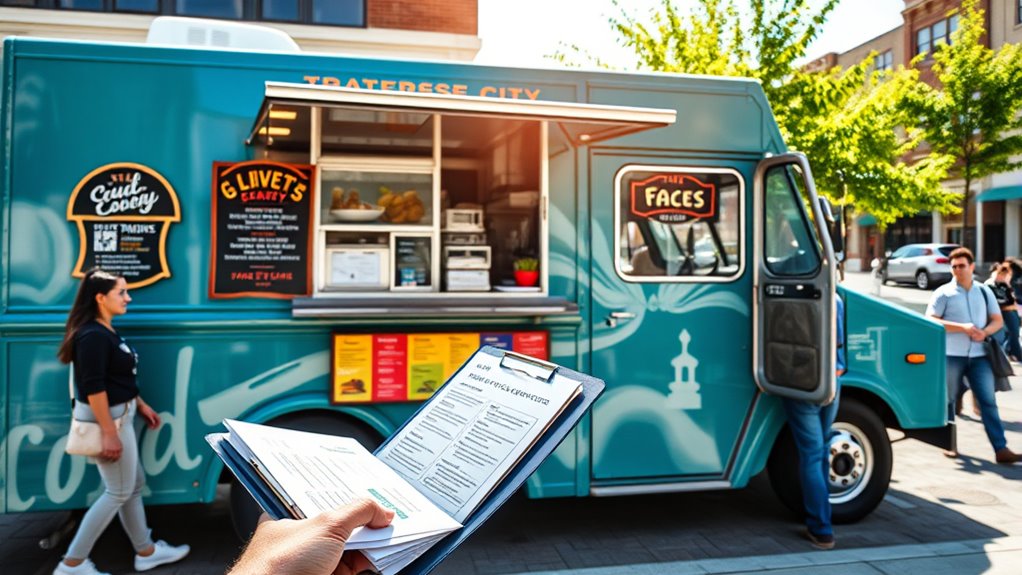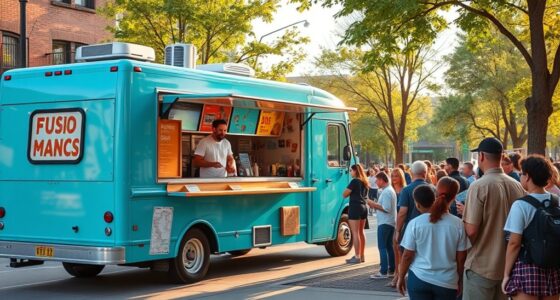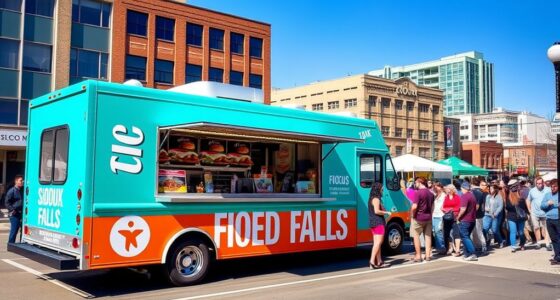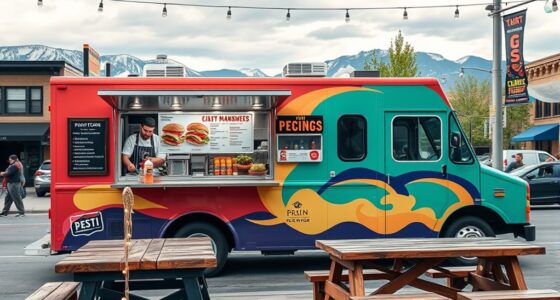To open a food truck in Traverse City, you’ll need permits like the Michigan Mobile Food Establishment license (~$192) and a city transient merchant license. Costs vary for permits, insurance, and utilities, so plan for around $1,200–$4,000 annually. Find prime locations in public parks or private properties with permission, and guarantee your menu meets health standards. Effective marketing on social media and local events can boost your success—continue exploring the steps to set up your business the right way.
Key Takeaways
- Obtain necessary permits including MDARD food licenses, Transient Merchant License, and land use permits for approved public parks and private locations.
- Budget for initial costs such as vehicle licensing (~$159–$192), insurance ($1,200–$4,000/year), and operational expenses like water, power, and marketing.
- Secure approved vending sites like Medalie Park and Civic Center Park, and ensure compliance with zone and site-specific regulations.
- Follow Michigan food safety standards, pass health inspections, and maintain proper food handling, storage, and hygiene practices.
- Promote your food truck through social media, participate in local events, and build customer loyalty to grow your business.
Navigating Permits and Licensing Requirements
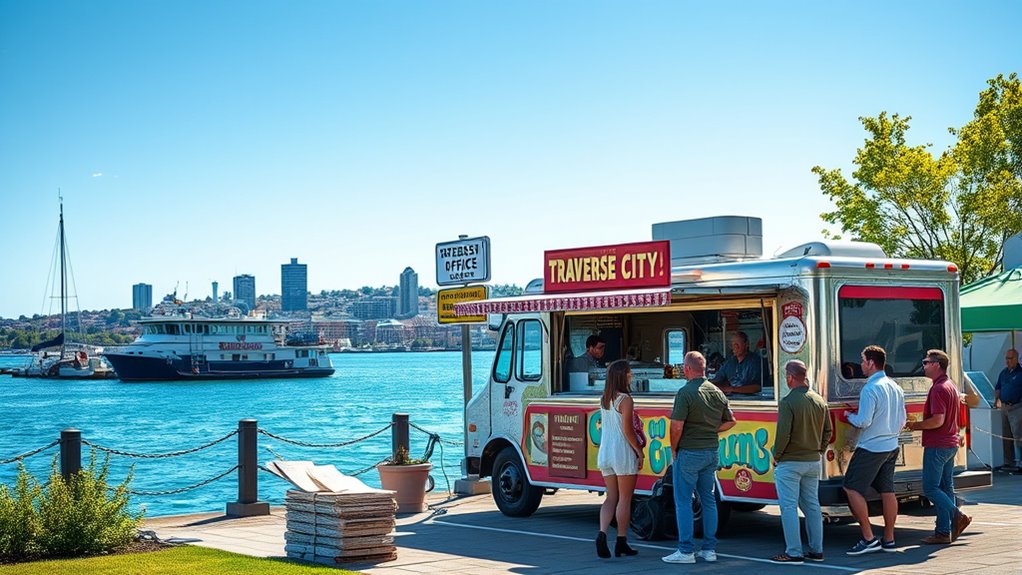
Navigating permits and licensing requirements is a vital step to legally operate a food truck in Traverse City. You’ll need a Special Transitory Food Unit (STFU) license from the Michigan Department of Agriculture & Rural Development (MDARD) to serve prepared foods. If your truck returns to a commissary daily, a Mobile Food Establishment license costing around $192 is necessary. For park operations, apply through the Grand Traverse County Parks and Recreation Department, providing your licenses, insurance, and event permissions. Additionally, obtain a Transient Merchant License from the city, which requires a sales tax license and detailed application. Zoning rules also apply; vending outside the Central Business District needs approval. Ensuring all licenses and permits are in place keeps your food truck compliant and ready to serve. Incorporating wall organization systems or visual display options can enhance your food truck’s exterior or interior aesthetics, attracting more customers and creating a memorable brand presence.
Understanding the Costs of Operating a Food Truck
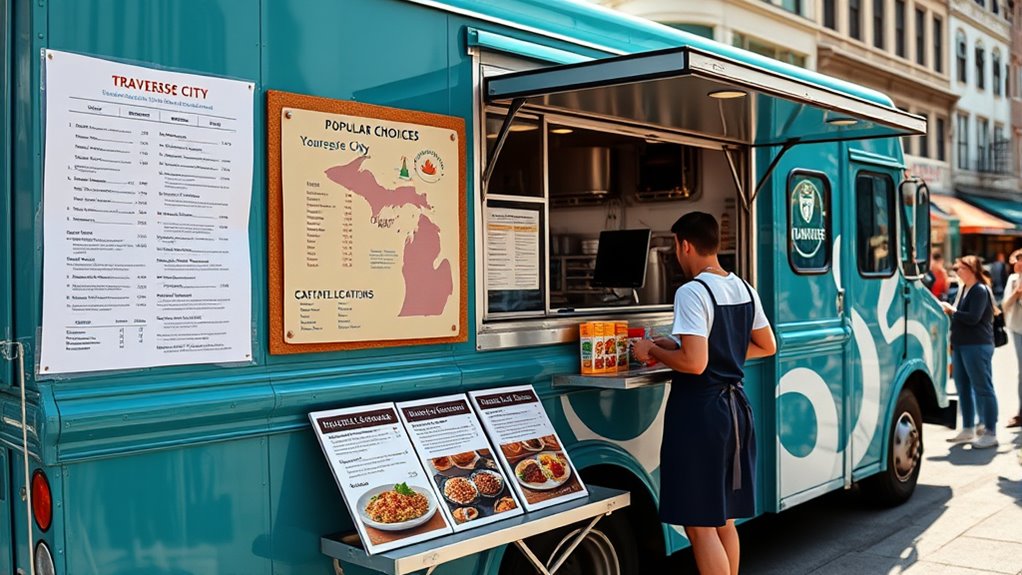
Understanding the costs of operating a food truck is essential for planning your budget. You’ll need to contemplate permitting expenses, insurance, and other miscellaneous fees that can add up quickly. Being aware of these costs helps you make informed decisions and avoid surprises down the road. Accurately estimating startup and ongoing expenses ensures you can sustain your business and plan for growth effectively. Additionally, considering well-being tips such as maintaining proper health and safety standards can prevent costly issues and promote long-term success.
Permitting Expenses Breakdown
Operating a food truck in Traverse City involves several permitting expenses that you need to budget for upfront. First, you’ll need a Mobile Food Establishment License, costing $192 annually, or a Special Transitory Food Unit (STFU) license for $159 if operating statewide without a commissary. For short-term events, a Temporary Food Establishment License is $73, valid up to 14 days. If you plan to operate at parks, permit fees depend on the duration and location, with applications requiring proof of a valid Michigan STFU license and $1 million insurance. Additionally, a commissary license costs $192 yearly, and plan review fees are $197. State and local health inspections cost about $90 per inspection annually. Budgeting for these permits ensures you stay compliant and avoid fines. Furthermore, understanding the contrast ratio of your equipment can improve the visibility and appeal of your food truck’s signage and branding.
Insurance and Miscellaneous Fees
To keep your food truck running smoothly and stay compliant with local regulations, you’ll need to budget for various insurance costs and miscellaneous fees. Insurance coverage includes general liability insurance, typically requiring at least $1 million per occurrence, and commercial auto insurance for your truck. You’ll also want business personal property coverage for equipment and business interruption insurance for lost income if your truck is temporarily out of service. In Michigan, premiums generally range from $1,200 to $4,000 annually, influenced by vehicle size, use, and driver history. Beyond insurance, expect operating fees for park or event participation, water and power costs, waste disposal, parking, fuel, and maintenance. Don’t forget additional expenses like licenses, health inspections, and marketing, which are essential for smooth operations. Proper insurance coverage is vital for protecting your investment and ensuring uninterrupted business operations. Additionally, understanding city regulations and permits can prevent costly fines and downtime.
Finding the Perfect Locations in Traverse City
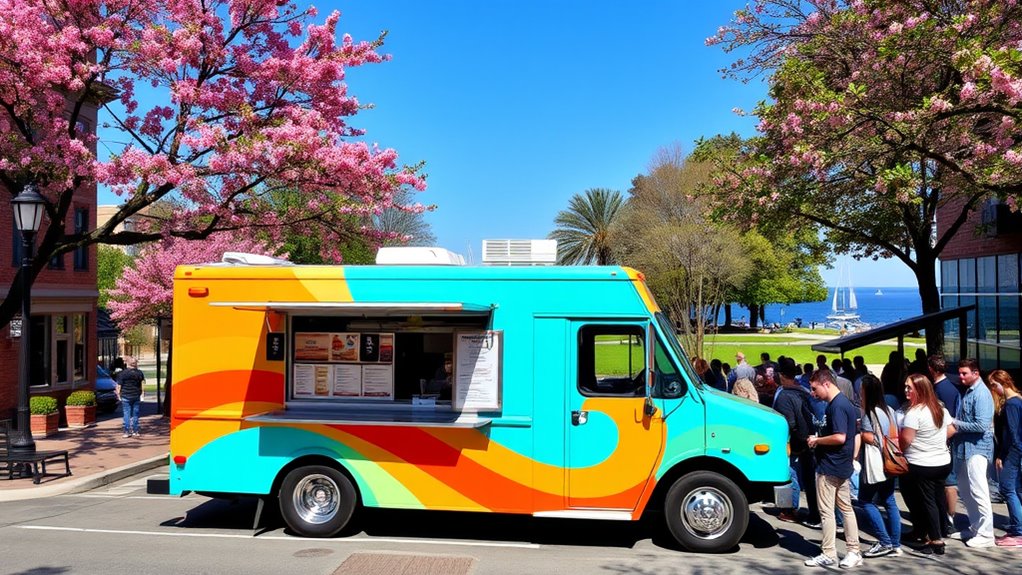
Finding the perfect locations for your food truck in Traverse City requires careful planning and awareness of permitted areas. Public parks like Medalie Park and Civic Center Park are approved spots where you can operate with a permit from Grand Traverse County Parks and Recreation. These locations often have assigned sites, and a site map is provided after approval. Keep in mind that vending in city parks and beaches typically needs explicit authorization or event sponsorship. For other sites, you’ll need a land use permit from the city, covering wastewater, water, stormwater, and fire safety. Private property and event locations are options too, but require permission from owners and organizers. High-traffic areas near downtown are ideal for attracting foot traffic and maximizing sales. Support for modern browsers ensures that your online permit applications and location maps are accessible without issues. Additionally, understanding the various permitting requirements can help streamline your setup process and avoid potential delays.
Ensuring Food Safety and Menu Compliance
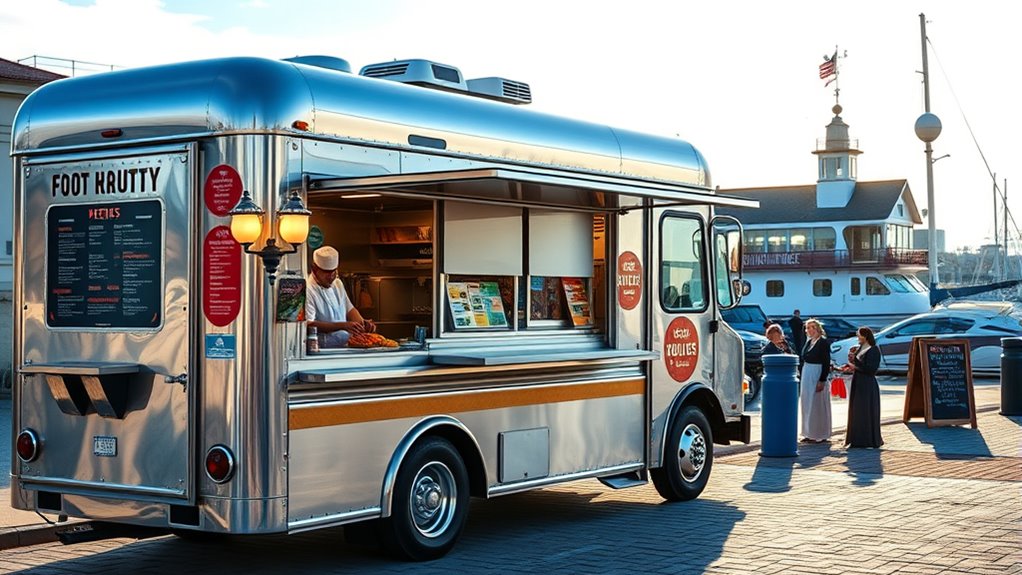
Ensuring your food truck complies with food safety standards and menu regulations is vital for smooth operation and customer trust. You must obtain a public health permit specific to mobile food operations in Michigan and pass regular health inspections. Your truck needs to be linked to a licensed commissary for daily food storage and waste disposal, unless you’re a Special Transitory Food Unit with more frequent checks. Your menu must follow MDARD guidelines, avoiding high-risk ingredients without proper approval, and include accurate allergen labeling. Proper food handling, storage, and maintaining correct temperatures are essential to prevent contamination. Additionally, your truck must have adequate sanitation facilities, like handwashing stations, and use non-toxic, easy-to-clean surfaces. Staying compliant guarantees safety, avoids fines, and builds customer confidence. Regularly consulting local health departments helps ensure ongoing compliance with evolving regulations and promotes best practices in food safety management.
Effective Marketing Strategies for Food Trucks
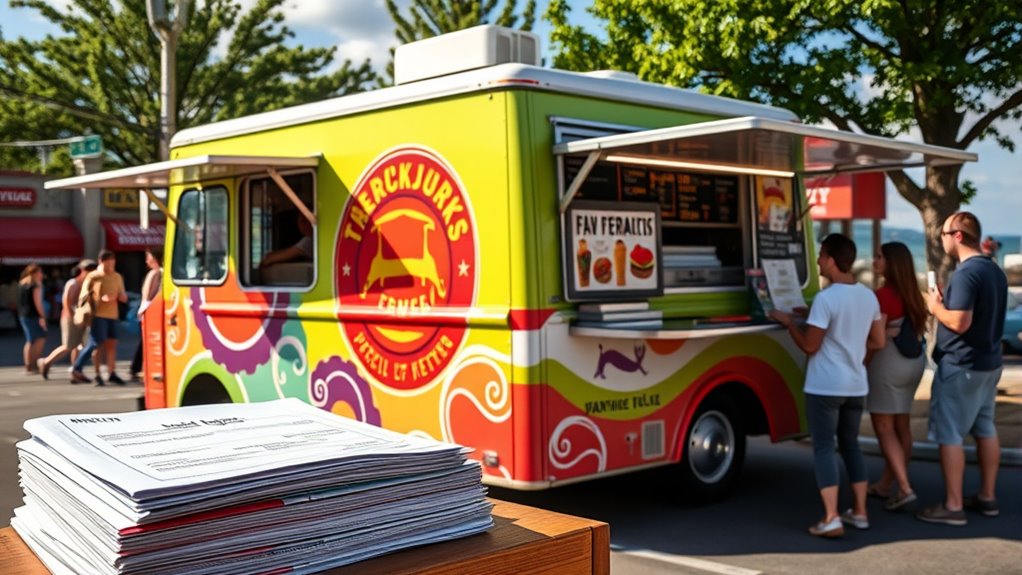
Effective marketing is essential for food trucks to stand out in a competitive landscape. You need to leverage strategies that catch attention and drive sales. Here are three proven methods:
- Social Media Marketing: Use platforms like Facebook, which 75% of food trucks favor, to promote specials, locations, and events. Regular posts and engaging content can boost sales by around 20% and attract customers discovering you through ads.
- Event Participation: Join at least three festivals or street fairs annually to increase visibility. Partnering with local businesses and targeting community events attracts foot traffic and builds loyalty.
- Customer Loyalty Programs: Implement rewards and email marketing to encourage repeat visits. Over half of food trucks see a 30% rise in customer retention through personalized marketing and loyalty incentives.
- Incorporate privacy policy practices to build trust with your audience, ensuring transparency about data usage and cookies.
These strategies help you connect with your audience and grow your brand effectively.
Operational Guidelines and Regulations to Follow
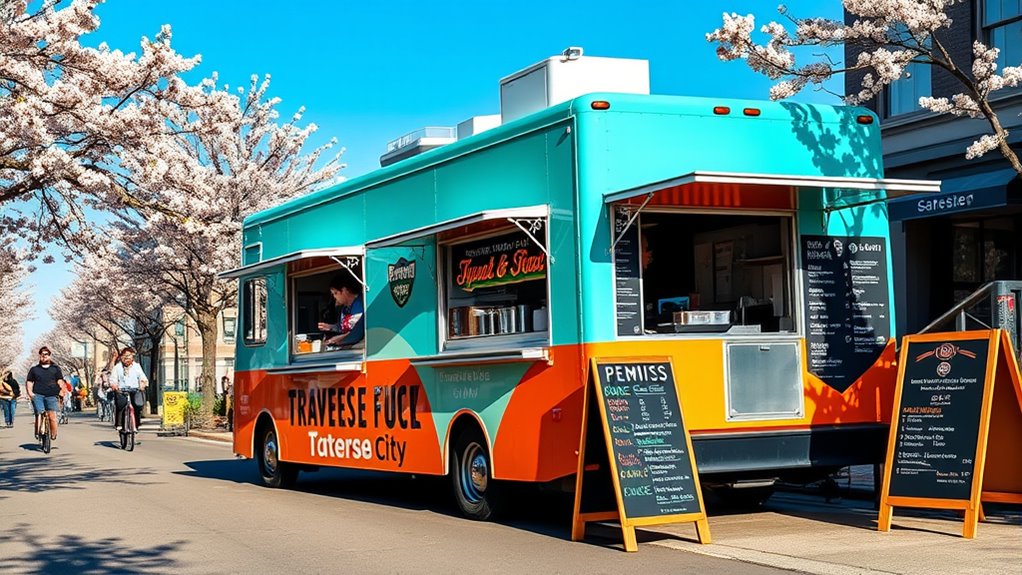
Maneuvering the operational landscape of a food truck in Traverse City requires careful adherence to local regulations and licensing requirements. You’ll need a Transient Merchant License and an Identification Badge for sales. A land use permit is necessary for designated food truck locations, especially in parks, which also require permits from the Parks and Recreation Department. Health permits, including a mobile food unit permit from Michigan, demand passing health inspections. Operating on private property necessitates written permission. Your truck must return daily to a licensed commissary for food prep and waste disposal, unless exempt. Food safety, potable water, wastewater disposal, and fire prevention are mandatory. Parking is restricted to designated zones, and you’ll need your own power and water sources. Liability insurance, while recommended, protects against operational risks. Additionally, understanding the specific requirements for essential oils for food service environments can help ensure compliance with safety and hygiene standards.
Frequently Asked Questions
How Long Does the Permit Approval Process Typically Take in Traverse City?
The permit approval process in Traverse City usually takes about three days for county permits, but city approvals can take longer due to additional steps like zoning and health inspections. If you’re applying for special event permits, it might add weeks, especially if city commission approval is needed. Make sure your application is complete and submitted early to avoid delays and streamline the process.
Are There Any Restrictions on the Types of Cuisine Allowed in Food Trucks?
Ever wonder if your dream menu faces restrictions? In Traverse City, there are no specific limits on cuisine types, so you’re free to serve anything from tacos to vegan bowls. Just make certain your food meets health standards, and if you plan to sell fresh or frozen meats, you’ll need Department of Agriculture approval. As long as you follow safety and zoning rules, your culinary ideas can come to life on wheels!
Can I Operate My Food Truck Year-Round in Traverse City?
You can’t operate your food truck year-round in Traverse City due to environmental and regulatory restrictions. Winters are too cold, risking equipment damage and making outdoor operation impractical. Additionally, permits and health regulations require trucks to use commissaries and adhere to specific hours. You’d need to winterize your truck, find alternative indoor venues, or consider storage during the off-season, which makes year-round operation challenging.
What Are the Specific Parking Requirements for Food Trucks in City Zones?
Think of parking regulations as the invisible hands guiding your truck’s dance through Traverse City’s streets. You must park only in city-controlled spaces with valid permits, ensuring your wheels don’t overstay their welcome. Operating hours are from 7 a.m. to 11 p.m., and only two trucks can share a lot at once. Stick to designated zones, avoid residential areas, and always follow permit rules to keep your operation smooth and hassle-free.
How Do I Handle Waste Disposal and Sanitation Compliance?
You need to provide appropriate waste receptacles on-site and guarantee daily removal of all litter and debris to stay compliant. Coordinate with licensed waste haulers for liquid waste, like sink or grease trap discharges, and follow local sewer limits. Obtain necessary permits, including a land use permit, and designate a sanitation-approved commissary. Keep all waste management practices aligned with city regulations to avoid penalties and protect public health.
Conclusion
Starting your food truck in Traverse City can be a rewarding venture, especially with its vibrant food scene. Did you know that food trucks generate over $2 billion annually across the U.S.? By understanding permits, costs, and marketing, you’ll set yourself up for success. Stay compliant, choose prime locations, and craft a standout menu. With careful planning, you’ll be serving happy customers and thriving in Traverse City’s bustling food landscape.
